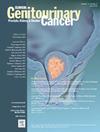Impact of TP53 Alterations on Clinical Outcomes in Penile Squamous Cell Carcinoma
IF 2.7
3区 医学
Q3 ONCOLOGY
引用次数: 0
Abstract
Background
Penile squamous cell carcinoma (PSCC) is a rare, aggressive malignancy with a high risk of mortality due to metastasis. A comprehensive understanding of its mutational landscape is critical for improving early detection and therapeutic strategies.
Methods
We analyzed tissue samples from 28 patients with PSCC treated at the Cancer Hospital of the Chinese Academy of Medical Sciences between January 2019 and March 2023. DNA from primary tumors and/or matched inguinal lymph nodes underwent targeted sequencing. Somatic mutations were profiled to compare primary and metastatic lesions. Statistical analyses assessed associations between mutational features, clinical outcomes, and treatment responses.
Results
A total of 980 mutations were identified across 354 genes. Frequently mutated genes included TP53 (67.5%), TERT (45%), CDKN2A (40%), FAT1 (37.5%), and NOTCH1 (30%). Copy number variations (CNVs) revealed amplifications in EGFR, SOX2, and MSH6 and deletions in CDKN2B and CDKN2A. A strong correlation was observed between mutational profiles of primary and metastatic lesions (r = 0.61, P < .001). Metastatic tumors exhibited higher tumor mutational burden (TMB) than primary tumors (38.9% vs. 9.5%, P = .030) and displayed a greater prevalence of mismatch repair deficiency-associated mutational signatures. Patients with higher TP53 mutation frequencies responded more favorably to immune checkpoint inhibitors (P = .024), with treatment efficacy strongly correlated (AUC = 0.938).
Conclusion
Key mutational alterations in PSCC, including high TMB and TP53 mutations, have significant implications for early diagnosis and personalized therapies. These findings support the potential use of specific genetic markers to guide targeted therapeutic approaches.
TP53改变对阴茎鳞状细胞癌临床预后的影响
背景:阴茎鳞状细胞癌(PSCC)是一种罕见的侵袭性恶性肿瘤,因转移而死亡率高。全面了解其突变景观对于改善早期发现和治疗策略至关重要。方法分析2019年1月至2023年3月在中国医学科学院肿瘤医院治疗的28例PSCC患者的组织样本。原发肿瘤和/或匹配的腹股沟淋巴结的DNA进行靶向测序。对体细胞突变进行分析,以比较原发性和转移性病变。统计分析评估了突变特征、临床结果和治疗反应之间的关联。结果354个基因共鉴定出980个突变。常发生突变的基因包括TP53(67.5%)、TERT(45%)、CDKN2A(40%)、FAT1(37.5%)和NOTCH1(30%)。拷贝数变异(CNVs)显示EGFR、SOX2和MSH6基因扩增,CDKN2B和CDKN2A基因缺失。原发性和转移性病变的突变谱之间存在很强的相关性(r = 0.61, P <;措施)。转移性肿瘤比原发肿瘤表现出更高的肿瘤突变负担(TMB) (38.9% vs. 9.5%, P = 0.030),并且显示出更普遍的错配修复缺陷相关突变特征。TP53突变频率越高的患者对免疫检查点抑制剂反应越好(P = 0.024),与治疗疗效呈强相关(AUC = 0.938)。结论PSCC的关键突变改变,包括高TMB和TP53突变,对早期诊断和个性化治疗具有重要意义。这些发现支持使用特定的遗传标记来指导有针对性的治疗方法。
本文章由计算机程序翻译,如有差异,请以英文原文为准。
求助全文
约1分钟内获得全文
求助全文
来源期刊

Clinical genitourinary cancer
医学-泌尿学与肾脏学
CiteScore
5.20
自引率
6.20%
发文量
201
审稿时长
54 days
期刊介绍:
Clinical Genitourinary Cancer is a peer-reviewed journal that publishes original articles describing various aspects of clinical and translational research in genitourinary cancers. Clinical Genitourinary Cancer is devoted to articles on detection, diagnosis, prevention, and treatment of genitourinary cancers. The main emphasis is on recent scientific developments in all areas related to genitourinary malignancies. Specific areas of interest include clinical research and mechanistic approaches; drug sensitivity and resistance; gene and antisense therapy; pathology, markers, and prognostic indicators; chemoprevention strategies; multimodality therapy; and integration of various approaches.
 求助内容:
求助内容: 应助结果提醒方式:
应助结果提醒方式:


